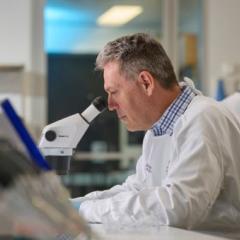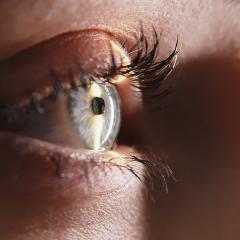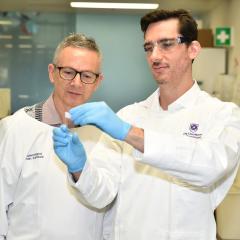Researching the genetic diversity of reef fish on the Great Barrier Reef has won a German researcher an Endeavour Research Fellowship to visit QBI at UQ.
Dr Sara Stieb will spend six months at QBI from October 2014, studying the molecular basis of visual diversity in areas such as visual pigments of fish and photic properties of habitats.
“The Great Barrier Reef has unique biodiversity-rich ecosystems, with coral reefs being the most colourful in the world,” Dr Stieb said.
“Comparing the visual system between cichlids and reef fish will contribute to answering a fundamental question in biology: identifying the mechanisms underlying the origin of species and external factors and environmental conditions that promote diversification.”
The project is part of a bigger study Dr Stieb has performed at the University of Basel, Switzerland, since 2012 in collaboration with QBI.
Dr Stieb will visit Lake Tanganyika in Africa to study freshwater cichlids, and will use her Australian stay to compare their visual systems with reef fish, hoping to reveal convergent patterns in colouration and visual sensitivities.
“Both freshwater cichlid and marine reef fish species represent spectacular products of diversification,” she said.
“Their amazing colour diversities and well-adapted visual systems make them ideal candidates for a comparative study of mechanisms involved in speciation based on the visual system.
“I also plan to widen my research approach and take into account visual plasticity effects in reef fish visual brain centres.”
During her stay she will be working with Professor Justin Marshall, head of the Sensory Neurobiology Group at QBI, who says this is an exciting new avenue of research.
“The old idea was that animals are born with genes that only do the job they have evolved for,” Professor Marshall said.
“It now looks that the whole genetic component to a number of systems including smell and vision are a lot more adaptable, and adaptable over a very short time span – less than what we would call evolutionary,” he said.
“Genes get turned on and off rather more quickly than we thought, so that is the area we are moving into, and using reef fish as a model system to study that.”
Dr Stieb is excited by the opportunity her stay at QBI offers her to conduct interdisciplinary research.
“QBI offers me a unique possibility to have access to a variety of facilities enabling me to combine molecular, physiological and neuroanatomical techniques,” she said.
Dr Stieb is currently in Australia at Lizard Island Research Station conducting a field trip ahead of her fellowship stay.
Also at QBI as part of the Endeavour Research Fellowships is Odette Leiter, working alongside Dr Daniel Blackmore in Professor Perry Bartlett’s laboratory.
During her six-month stay Miss Leiter will study the role of exercise in neurogenesis and cognitive ability in both young and aged animals.
“Using place avoidance testing we will measure cognitive function in young and aged animals following an acute period of exercise,” she said.
“Following this we will use immunohistochemistry to measure new-born adult immature neurons and activated mature neurons.
“We are hoping to find an increased ability to learn in young and aged mice after acute periods of exercise.”
This research forms an important part of QBI’s work to understand the complex underlying mechanisms of adult neurogenesis – a major step towards unravelling this largely unknown area of research.
The 2014 Endeavour Research Fellowships form part of the Australian Government’s Australia Awards, and are administered by the Department of Education.
Media: Mikaeli Costello, Director Advancement and Communications, Queensland Brain Institute, +61 401 580 685 or mikaeli.costello@uq.edu.au; Professor Justin Marshall, Queensland Brain Institute, +61 7 3345 1397, +61 423 024 162, or justin.marshall@uq.edu.au



